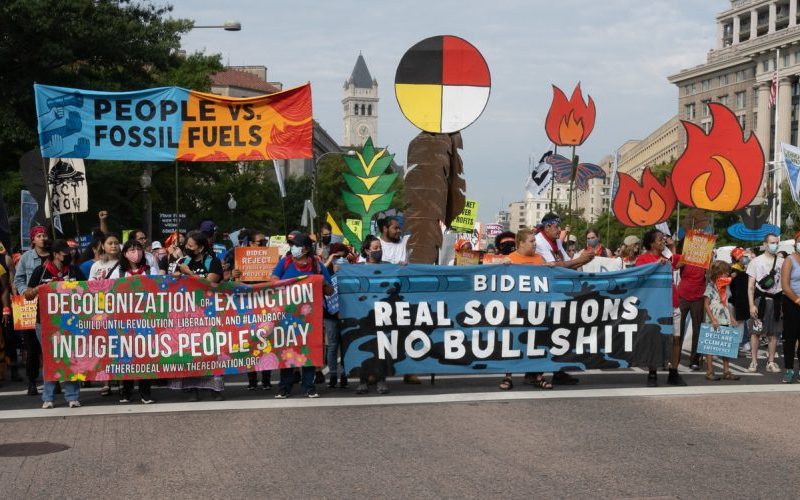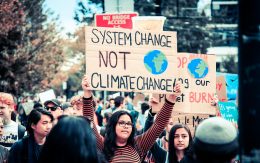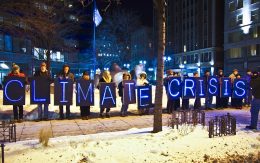The recent news headlines of Kylie Jenner’s & Taylor Swift’s private jets fiasco have polarized Twitter users. Kylie Jenner took the headlines after she was rumoured to have flown for 3 minutes to avoid a 40-minute trip around the city. It was further flamed by an Instagram post captioned ‘you wanna take mine or yours?’ with her and her partner Travis Scott posing in front of two private jets. Taylor Swift received backlash following reports of her being named as the biggest private jet polluter amongst celebrities. While some defend them by jumping through ‘loopholes’ of security and individualism, many argue the callousness in celebrities behaving out of touch and gloating about poor environmental-friendly choices as their poorer counterparts are forced to use paper straws that dissolve in minutes.
The main issue discussed here is climate change, one of the most defining issues of the 21st century with devastating ramifications which could potentially result in the cessation of humanity and millions of other biotic species. Environmental scientists have stated urgent action must be taken to alleviate the causes aggravating the climate crisis by 2030, after which the crucial period will pass, and the global warming temperatures will irrevocably rise.
Affected by the climate crisis: Rich vs poor
The recent outrage against celebrities only addresses one of the multifaceted aspects of this crisis: carbon footprint. This is a term used to measure greenhouse gases generated by an individual’s lifestyle. Celebrities are some of the multitudes of rich individuals whose carbon footprints are exponentially higher than some underdeveloped countries combined. In fact, studies have shown that the richest 1% contributes 70x more carbon emissions than the bottom 50% of the world population. However, the support received by the celebrities from their fans outlines the deficit of public awareness and knowledge about the crisis. To them, the problem is one of the future – not for people of today to bear.
In reality, climate change is a present crisis for billions globally. Island nations such as Maldives, Fiji, Tuvalu, Micronesia, Kiribati, and many others are sinking and are expected to be submerged by 2100. Rivers, lakes, and the underground are barren, engendering a water crisis in various regions. Eventually, these lands will become unlivable, spawning a new category of a refugee crisis – climate refugees. Plenty will migrate to countries tolerable to survive with basic necessities such as water, food, and shelter.
Natural disasters will be the norm as the planet adapts to drastic changes in temperatures, wreaking havoc. For instance, wildfires are now much more prominent and destructive. Over the years, such wildfires have occurred in Australia, Greece, Italy, Spain, Syria, South Korea, and many more countries. The Australian wildfires alone have caused colossal destruction of forestry covering millions of hectares and killed or harmed over 3 billion animals. Earthquakes and floods have also occurred on multiple occasions globally in Iran, Afghanistan, India, Japan, Germany, Malaysia, UAE, and more. The world is also on the brink of a food shortage crisis. Although exacerbated by the Ukraine War, other reasons include storms and floods, wildfires and locust swarms, and even warmer climate the crops cannot thrive under.
The poorest of the population will be most affected by the disruption in the global food chain as food prices will increase dramatically while remuneration remains the same or even lower; they will not be able to afford food. Global warming will also increase the risks of heatstroke, placing people who cannot afford shelter and air conditioning more susceptible to fatality.
Underdeveloped countries are also more likely to be plagued by the crisis compared to their richer developed counterparts. The former possess fewer resources to mobilize and mitigate climate change; a lack of funding for R&D of sustainable technologies, deficit of capital to install renewable energy technologies such as solar panels, wind turbines, or dams. It is also strenuous for poorer states to return to normalcy following natural disasters as the destruction would be worth losses of hundreds of millions. These countries suffer the worst ramifications of the crisis they barely partook in engendering. The people from such countries are also more vulnerable to displacement but unlikely to be accepted as refugees in ‘safer’ countries.
The climate crisis intensifies the risks of new diseases since the melting of ice caps releases various previously frozen viruses. The warm temperatures also allow existing viruses to mutate. This is particularly detrimental in poorer countries without adequate infrastructure to combat epidemics. This division was underlined during the COVID-19 pandemic when PPE kits and vaccines were last delivered in underdeveloped countries while richer states were able to vaccinate their citizens soon after the vaccines were developed.
Underdeveloped countries are often bullied by richer states for political reasons. They are coerced to accept the interests and terms of the more powerful, such as aligning with political ideologies or permitting further exploitation of natural resources – the relationship is inherently asymmetrical, with the poorer state receiving the shorter end of the stick. Hence, these countries are further vulnerable as they could be isolated by richer countries. For instance, COVID-19 vaccines were withheld for ‘political’ reasons and were allowed to expire rather than sending them to those who were in dire need of them.
Countries globally are failing to fulfil their commitments made at the Paris Climate Accords and the Kyoto Agreement. The non-success is alarming because countries are not being properly sanctioned for exceeding the targeted limit. They are, at most, inefficaciously condemned by countries. Violating the set agendas is thus inconsequential to countries which prefer short-term profits at the expense of long-term irrevocable havoc; they are not provided with any incentives other than saving the planet. The countries ruled by senile politicians who may not live to witness the devastation caused by the crisis will not find the proposal of aiding the planet to remain livable attractive.
Nevertheless, these multilateral agreements are being broken as several Middle Eastern countries such as Kuwait, UAE, Saudi Arabia, Oman, and Iran are enduring the hottest weather in the world at more than 52C. While the Middle East can survive high temperatures as their cities are mainly air-conditioned or built to relieve heat, unprecedented warm weathers in the northern regions of the world find it more difficult. The warmer climate in Canada and the UK has been proven fatal as hundreds died of heatstroke. This is primarily because the infrastructures of northern countries are designed to absorb heat and trap them to keep indoors warm. They also lack air conditioning.
Wildlife and the climate crisis
The changes transpiring on the planet are also affecting other species. Several animals we grew up spotting at zoos and safaris are expected to be extinct by 2050. Amongst them are tigers, Javan rhinoceros, cheetahs, red tunas, elephants, gorillas, dolphins, polar bears, turtles, and more.
Endangered animals, who are crucial to maintaining the earth’s delicate balance of flora and fauna, can be protected in multiple ways. For instance, pandas were once on the verge of extinction until strenuous efforts to preserve their existence were made, particularly by China, which is the sole owner of pandas around the world. Although they remain vulnerable, there are more pandas today than 10 years ago. Pandas are now representative of a new form of diplomacy known as Panda diplomacy, where China ‘gifts’ countries pandas for a few years as a sign of cordial relations. Although, the host countries are expected to pay for all the expenses incurred in managing the animal and must follow stringent rules set to protect them.
Yet, pandas are a special case. The aforementioned animals have not received the same amount of preservation efforts. Wild animals are generally harmed through poaching, deforestation, or natural disasters. The laws established to protect them are not sufficiently stringent to discourage people from engaging in such activities. Governments must create sanctuaries for wild animals to live as they are supposed to. Similar to ‘Jurassic World’, they can be saved by separating them from the human world and protecting them from any deliberate harm. Zoos must also be abolished.
Maritime life
Coral reefs are an oceanic ecosystem imperative for sustenance in both land and ocean. They protect coastal areas by reducing the force of waves and provide a crucial source of income for millions of fishermen around the world. Coral reefs are diverse in sealife: thousands of species can be found living in the area. However, they cannot survive in high temperatures. Global warming is causing the bleaching of coral ecosystems, eventually leading to their deaths. The Great Barrier Reef in the Pacific Ocean is named for being the world’s largest coral reef system, stretching across 2,300 kilometres. Presently, around two-thirds of the area is bleached corals, causing great concern to environmentalists.
Commercial fishing, which involves corporations and huge boats, also destroys ocean life. Their fishing style is to drop a massive net onto the ocean bed and drag it around for kilometers, capturing every living creature and ultimately impairing corals. Commercial fishing also creates job losses for millions of local fishermen, and their extermination of life in seas also prone to calamitous storms and tsunamis.
Also located in the Pacific Ocean is an area unknown to many, named the Great Pacific Garbage Patch. It is a buildup of non-degradable plastic debris and waste found in the ocean bodies, stretching across North America until Japan. A recent study by oceanographers and ecologists suggests that 70% of waste found in the ocean sinks to the ocean floor. Hence, the waste seen at the surface level of the Pacific Garbage Patch only constitutes 30% of the total plastic waste accumulated there.
Misleading and deceitful “greenwashing” by companies
As discourse surrounding climate change gain more traction, corporations have resorted to ‘greenwashing’. Greenwashing is defined as organizations and corporations falsely marketing themselves as eco-friendly instead of truly minimizing their negative impact on the environment. It is misleading and deceitful to consumers who intend to lead a more sustainable lifestyle. Examples of greenwashing include companies like Coca-Cola and H&M introducing ‘organic’ products with green packaging. Another example includes the banning of single-use plastic straws, citing they are non-biodegradable and polluting properties and excessive usage. Around 500 million are being used daily in the US alone. They were replaced with paper straws, which dissolve quickly and become unusable. While the intentions look like a step forward toward sustainability, the true irony is paper straws are provided on top of a plastic cup, which remains legal to use and comprises more plastic components than straws. In short, organizations behave as though their changes are better choices for the environment while it is equally inefficient for the environment.
In search of a culprit
So, who is to be blamed for climate change and the lack of action taken to assuage the crisis? A system is to blame; an intangible ideology through which modern society operates: Capitalism. The concept of infinite human wants and a system which caters to them is impossible to sustain in a world of finite resources. Various multi-billion-dollar industries and corporations flourish from the exploitation of limited natural resources, whether they are gold and diamonds, cattle, or fossil fuels, it eventually runs out. Additionally, they must destroy other natural assets such as forestry and ocean life to attain them. The greed fostered by capitalism entitles companies to feel complete disregard for the environment, and oftentimes, the government enables such destructive behaviour through lenient laws and regulations. There is a clear divide between the global North and South regarding this matter. The conglomerates are headquartered in the global north, but their resources and manufacturing (the dirty work) take place in the global South, a region comprising of mainly undeveloped countries who, as mentioned before, are the most vulnerable to the effects of the climate crisis.
What can be done? Collective action as a solution
Collective action is the solution to alleviate climate change, and we have the capability since we previously successfully diminished the holes in the Ozone layer of the atmosphere. The layer which traps harmful Ultra-Violet (UV) rays radiated by sunrays could have proliferated cases of skin cancer, eyelid cancers and cataracts, and premature ageing. Governments, corporations, environmental IGOs and NGOs, and even ordinary citizens united to significantly limit carbon emissions, the primary cause of the holes. The holes eventually began to close, indicating the efficacy of working together.
Governments are principal figures for crucial changes to occur. They have the authority over all areas of society, including multinational corporations. They must legislate stricter environmental laws, such as luxury and carbon taxes for excessive emissions of greenhouse gases, eradicating subsidies for jet fuels to discourage their private use, charging fines for food wastage by restaurants, and criminalizing lobbying to avoid collusion between corporations and government officials. Factories must be forced to shut down if they fail to follow the environmental regulations by polluting their surroundings with microplastics, harmful chemicals, and other toxic wastes (eg. DuPont, Formosa). Government action must be expeditious as scientists have warned we have less than eight years to palliate the crisis. Commercial fishing must also be eliminated or strictly regulated to prevent the annihilation of ocean life, including the coral reef systems.
Cities must adapt to be more environmental-friendly by installing solar panels or other renewable energy technologies, introducing more accessible public transportation and cycle tracks to discourage the use of cars, and introducing free water dispensers to reduce the use of single-use plastic bottles.
Everyone must do their part to resolve the crisis. Push national governments, corporations, and even rich celebrities to be more environmentally conscious by mobilizing. Join and support several local and international environmental organizations and activists, watch the news regularly and be up to date with the latest developments, and raise awareness by sharing information on social media and amongst your close ones. Be vocal.
Several environmental documentaries have been released, which inform viewers of the effects of climate change. These include ‘Our Planet’ and ‘A Life on Our Planet’ by David Attenborough and Chasing Coral, all of which are available on Netflix; 2040, Extinction: The Facts, and several other videos on YouTube by the likes of DW Documentary are other educational movies to learn more about our delicate planet.
The climate crisis is a future concern to those who choose to remain blissfully ignorant of the reality in which people’s livelihoods, countries, homes, nourishment, and planet are being actively destroyed. Human comfort is attained at the expense of the planet. But eventually, they will be forced to pay attention as they are forced to experience the devastation caused by the crisis, and by then, it will be too late to make a difference.
The truth is climate change is a problem of today, and we must act today. Sustaining our survival on this planet is a collective issue.
Sources BBC (2020) ‘Australia’s Fires ‘Killed or Harmed Three Billion Animals’, BBC [online] available from <https://www.bbc.com/news/world-australia-53549936> Benesh, M. (2020) ‘Why are DuPont and Chemours still Discharging the most Notorious ‘Forever Chemical’, Environmental Working Group [online] available from <https://www.ewg.org/news-insights/news/why-are-dupont-and-chemours-still-discharging-most-notorious-forever-chemical> Choudhury, A. (2022) ‘Lithuania should not have Cancelled its Vaccine Donation to Bangladesh’, The Diplomat [online] available from <https://thediplomat.com/2022/03/lithuania-should-not-have-cancelled-its-vaccine-donation-to-bangladesh/> Columbia Gorge Climate Action Network (2022) ‘Emissions of World Top 1% is 70x the Bottom 50%’, Columbia Gorge Climate Action Network [online] available from <https://cgcan.org/the-worlds-top-1-earners-emit-as-much-ghg-as-the-bottom-50/#:~:text=That’s%20one%20conclusion%20of%20a,are%20responsible%20for%20massive%20emissions.> Dickson, C. (2022) ‘Hundreds died because they couldn’t escape B.C.’s extreme heat. Alerts wouldn’t have saved them, advocates say’, CBC [online] available from <https://www.cbc.ca/news/canada/british-columbia/bc-changes-extreme-heat-2022-1.6480993> Gibbens, S. (2019) ‘A Brief History of how Plastic Straws took over the World’, National Geographic [online] available from <https://www.nationalgeographic.com/environment/article/news-plastic-drinking-straw-history-ban> Holland, B. (2018) ‘Panda Diplomacy: The World’s Cutest Ambassadors’, History [online] available from <https://www.history.com/news/panda-diplomacy-the-worlds-cutest-ambassadors> Middle East Eye (2021) ‘Temperatures Top 50C in Several Countries’, Middle East Eye [online] available from <https://www.middleeasteye.net/news/middle-east-heatwave-oman-uae-kuwait-iran-temperatures-top> Mettler, L. (2022) ’13 Islands that will Disappear in the Next 80 Years’, Reader’s Digest [online] available from <https://www.rd.com/list/islands-will-disappear-80-years/> Milman, O. (2022) ‘A 17-minute Flight? The Super-Rich who have ‘absolute disregard for the planet’’, The Guardian [online] available from <https://www.theguardian.com/environment/2022/jul/21/kylie-jenner-short-private-jet-flights-super-rich-climate-crisis> Mitropoulos, A. (2022) ‘Millions of COVID-19 Shots set to go to Waste, as Vaccine Rollout Slows’, ABC [online] available from <https://abcnews.go.com/Health/millions-covid-19-shots-set-waste-vaccine-rollout/story?id=84111412> National Geographic (2022) ‘Great Pacific Garbage Patch’, National Geographic [online] available from <https://education.nationalgeographic.org/resource/great-pacific-garbage-patch> Placido, D. D. (2022) ‘Taylor Swift Provokes Backlash and Mockery after Topping List of Private Jet Polluters’, Forbes [online] available from <https://www.forbes.com/sites/danidiplacido/2022/07/30/taylor-swift-provokes-backlash-and-mockery-after-topping-list-of-private-jet-polluters/?sh=68c47e17d0d0> Simmonds, J.T., Wilson, D., Lavigne, S. & Rolfes, A. (2021) ‘Formosa Plastics Fined $2.9 Million for Endangering Public, Workers in Texas’, Center for Biological Diversity [online] available from <https://biologicaldiversity.org/w/news/press-releases/formosa-plastics-fined-29-million-for-endangering-public-workers-in-texas-2021-09-14/> Smith, Z. C. (2022) ‘By 2030, Earth could Experience One-per-Century Heatwaves every other Year, Study Says’, Forbes [online] available from <https://www.forbes.com/sites/zacharysmith/2022/01/06/by-2030-earth-could-experience-once-per-century-heat-waves-every-other-year-study-says/?sh=ca0f68e46814> Sustainability for All (2022) ‘Top 10 Animals in Danger of Extinction’, Sustainability for All [online] available from <https://www.activesustainability.com/environment/top-10-animals-in-danger-of-extinction/?_adin=11551547647>









Be First to Comment